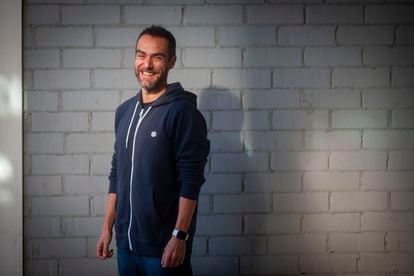The Spanish YouTuber who made €1 million in a week
When Romuald Fons started his career in SEO, he made just €2.48 a month. Now he sells courses on how to improve video rankings for €750
/cloudfront-eu-central-1.images.arcpublishing.com/prisa/VF5RQOJEEVEUXG3VE2KRU3S25E.JPG)
“YouTube needs people to spend all day watching videos,” says Romuald Fons, an entrepreneur and YouTuber, with 721,000 subscribers to his channel on how to get websites rated in Google’s top search results.
Fons, 43, from Barcelona, knows all about YouTube. He spent two years maneuvering his channel into position and analyzing other channels to see what works best. His most viral video wasn’t even related to digital marketing – it was about how he got a six-pack in six months. “It was an experiment,” he explains to EL PAÍS from his office in Barcelona’s Poblenou neighborhood.
In December, he put all his advice in a course called CreceTube, which he sold for a week for €700 as a special introductory offer. Around 1,500 people bought it, according to the documents Fons showed to EL PAÍS, earning him over €1 million in seven days.
YouTube’s algorithms can be hacked. It’s not like GoogleRomuald Fons, SEO expert
Attention-harvesting algorithms that promote extreme viral and extreme content are the subject of growing controversy. YouTube is one of the main platforms accused of pushing users into ever more radical political positions by promoting increasingly outrageous videos to keep them hooked.
But this is not Fons’ field of concern. “YouTube’s algorithms can be hacked,” he says. “It’s not like Google [YouTube and Google are owned by the same company, Alphabet]. Google has to show the user what they want to find because otherwise, they will stop using it. YouTube promotes clickbait [content designed to drive traffic to a website] in an extreme way.”
His course is for people who are starting out on YouTube and want to grow their audience. It includes tricks with names like SEOshock, Instaclick and SEOcreto to improve video content and rankings – if you type “YouTube course” into Google and YouTube, Fons’ videos are in the top results. “I’ve bought every course there is and I explain things that have never been explained,” he says. “We explain how to use Google so you know what type of content to create.” Among the comments on the course, there are, of course, users who think it’s a scam, and have created their own YouTube videos with their own explanations. But Fons is unfazed: “Clickbait is what you have to do,” he says.
Neither is Fons concerned about the Spanish YouTubers who make off to Andorra for tax reasons. “It’s not my place to give my opinion on what they do,” he says. “I am not strictly a YouTuber. I am an entrepreneur who has a YouTube channel. It is different. In my case, the money coming in is part of the business. I generate wealth in Spain and will continue to be taxed here. I don’t have that option [to go to a tax haven]. If I wanted to do that I would have to take advantage of legal loopholes and I’m not going to.”
Fons’ main global competitor is the Briton Neil Patel, who has 100,000 more subscribers than Fons but fewer total views despite having posted more videos. Forty percent of Fons’ audience is in Latin America – YouTube provides YouTubers with this kind of data in the form of graphs. “It has one that shows the average retention of all YouTube videos of the same length as yours,” he says. “If your video is above average, it promotes you.”
Rags to riches
Fons’ recent success is the latest step forward in a long, and not always successful, career in digital marketing that started in earnest in 2013 when he decided to specialize in search engine optimization (SEO) – the name given to strategies to increase website traffic from search engines. Today SEO is a basic tool for most companies with digital interests: businesses that do not appear on page one of Google’s results, do not exist. Now, as Fons points out, the coronavirus pandemic has meant that even long-established businesses have had to close their doors if they have failed to devise a digital strategy.
In January 2013, Fons did nothing but create websites in order to get them to show up in Google searches, place ads on them and attract hits. The first month, he created 10 websites and made €2.48. He could be forgiven for feeling discouraged.
But, the self-taught Fons plowed on. In order to learn which criteria Google rewarded in its results, he ended up creating 1,430 websites. Each one had something different. “I was seeing which ones worked well and which ones didn’t,” he says. “I started to create my own positioning strategy.”

The choice of sites was not random. He looked for the ones that had the most searches and paid the most for ad clicks: “Paella, Inem courses [courses run by the National Institute of Employment], outlets,” he says. “For recipes, I had the 220 keywords with the most traffic: mojitos, baked chicken….” Fons wrote the content for each page and used Adsense, a Google tool, to fill the pages with ads. When someone clicked, Fons earned money. Within a year, he was earning €1,500 a month. In 2016, three years after starting out, he was making more than €18,000 a month.
Put like that, it sounds easy, but Fons scarcely made €1,300 in the whole of 2013. At the time, he was living in Spain’s Valencia region and was making a living by writing texts at night for €4 each for the website, Fiber.
Fons’ story is typical of a tech entrepreneur – he’s had several failures, has fully committed to getting better at what he does, has made a video that leads to something new and has put in long working hours. His first failure was as a student and musician. After enrolling to study architecture, he left university to go on a six-year tour as a singer of a band called Rembrandt42, which is still on the music-streaming site Spotify. He met his ex-wife during a concert and, subsequently settled down to a job at a family-run water treatment company. “We were cleaning legionella tanks,” he recalls.
But Fons had big dreams. “I wanted to do like [Facebook founder Mark] Zuckerberg and blow things apart,” he says. First, he created a social network for collectors, called Nakoko. “It wasn’t much of a start-up,” he says. “It was just me putting all my work and money into it. I went totally broke.” After that, he tried to set up a Spanish eBay, called lovende. “I got even more broke,” he says. “When I couldn’t even afford to pay for my son’s optional vaccinations, everything changed. They cost €80 and I didn’t have the money. That’s when I stopped blaming others.”
Fons’ company BIGSEO Agency had a turnover of €4 million in 2020
During this period, he had, however, learned something about SEO and digital marketing. Then he saw a video of entrepreneur Pat Flynn, who was earning passive income from Google. “I thought, if this guy can do it, so can I,” he says.
“Companies would call me and ask me why I was being ranked above them,” he says. “That’s when I set up the agency.” After two years of quietly carving his own niche, he began to make a name for himself. Now, his business BIGSEO Agency, has a staff of 41. Each client pays him more than €30,000 a year for his services. In 2020, his company had a turnover of €4 million.
Thanks to his own personal journey, Fons has been able to observe the evolution of SEO. Google has always aimed to be the gateway to the internet. If the search engine didn’t work well, users would not be using the site millions of times a day. According to Fons, typing in the keywords is no longer enough. Google should also know whether someone searching for Nike sneakers wants to buy a pair for running or is an Air Jordan collector. “It’s about understanding the user’s intent even if the keyword isn’t there,” he says. “Whether the search is for boilers or cheap flights, the question is – what’s the problem?” Google will reward whichever website knows how to answer this best. “Getting customers for boilers is no longer about positioning ‘boiler service’ in Google,” he clarifies.
As a YouTuber, Fons has been a public figure with an impact on thousands of people. His community of followers is called Marketing Furious and they have a Facebook page with 75,000 members. That has also led him to address mental health issues that members of his community are increasingly open about. “Our brains are not wired to absorb thousands of opinions about us a day,” he says. “YouTuber El Rubius is under brutal pressure. But over a thousand people have paid me more than €700 to teach them something. The pressure is cranked up. Your subconscious gets the better of you. You think you’re strong and you can do it, but you can’t.” Fons has also encountered angry followers out and about. “When you have millions of views, anything can happen,” he says. “Think of a full Barça [soccer] stadium; 100,000 people. I’m sure there are 10 that are nuts.”
Fons is focused on video survival in an era when the apps TikTok and Instagram Reels are taking off. In his favor, his old videos keep popping up at the top of digital marketing searches. “On the other networks, you make a video and after eight hours no one sees it,” he says. “You can reach an audience, but turning it into a business is another matter. TikTok is all about short attention spans.”
English version by Heather Galloway.

/cloudfront-eu-central-1.images.arcpublishing.com/prisa/EFNOTS6IUYQEVVVEZAVRYX6XOY.jpg)
/cloudfront-eu-central-1.images.arcpublishing.com/prisa/MQX3F4E2EBGYZCIUVZNK5PX4AQ.jpg)










































